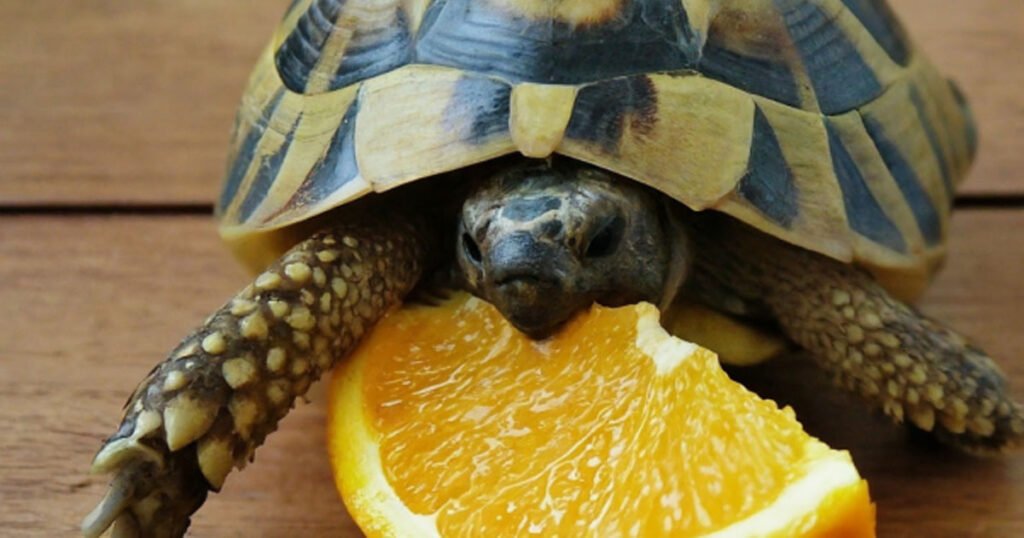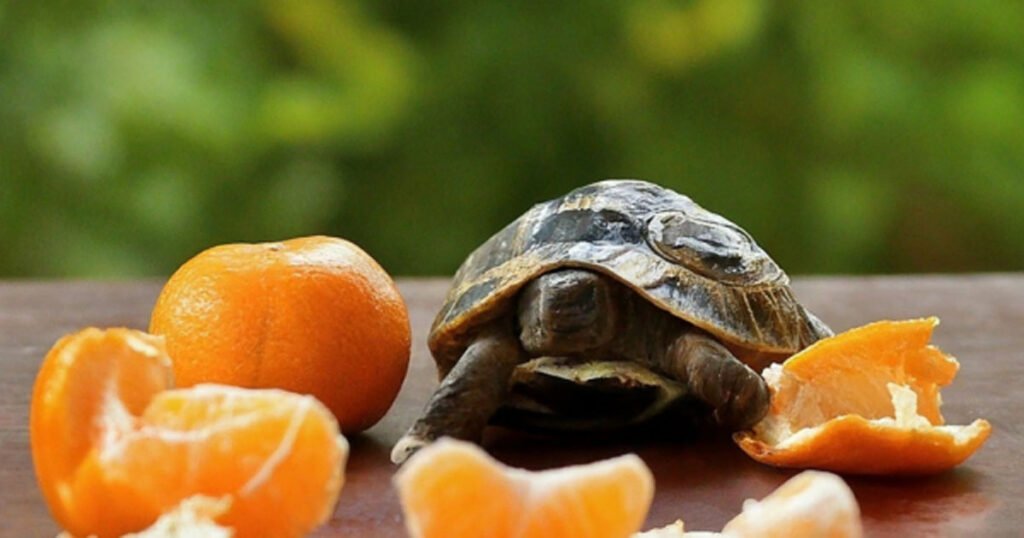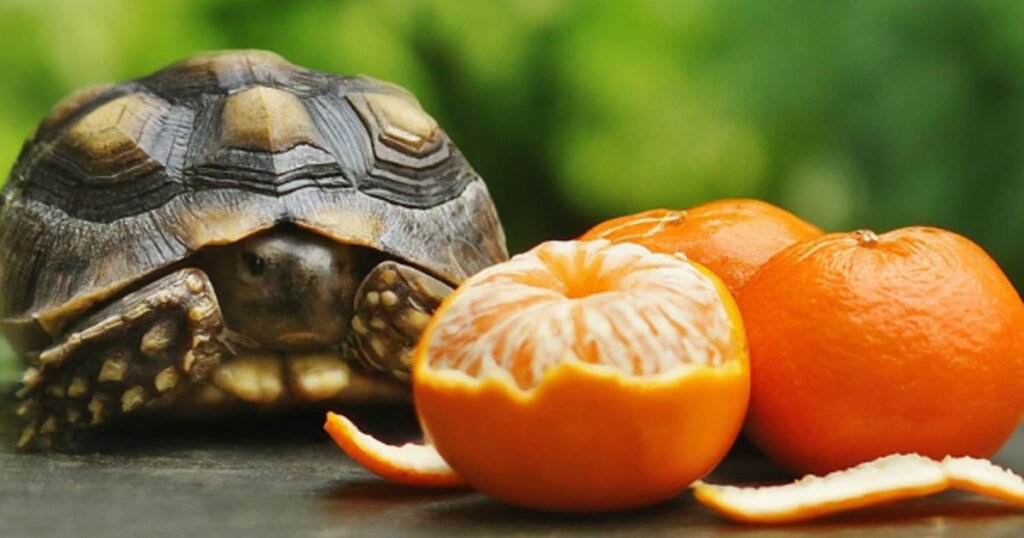Are you curious about adding a zesty twist to your pet turtle’s diet? The question naturally comes: Can turtles eat oranges? Turtles are charming, slow-moving creatures that raise many questions about their diet. Especially, when you are a turtle pet owner, thinking about their meal preferences is common. The good news is that many omnivorous turtle species, known for their omnivore eating habits, can indeed enjoy a variety of fruit collections in moderation.
If you are curious about the facts, should you include oranges in your pet diet, here we will talk about whether Can turtles eat oranges? Or how to give oranges to turtles. Check out all the benefits, precautions, and types of turtles that like this citrus treat. Let’s explore this delightful aspect of turtle care!
Table of Contents
Can Turtles Eat Oranges? The Answer

Yes, turtles can eat oranges. However, it’s crucial to check your specific species of turtle, as most omnivorous turtles can indeed enjoy this citrus treat. If you’re offering oranges to your turtle, make sure to remove the seeds and peel, leaving only the flesh inside.
Although there aren’t a lot of scientific studies about oranges and turtles, providing turtles with diverse and nutritious foods is a good idea. A diet rich in small pieces of fruit and vegetables is good for them. While turtles eat a variety of foods, including fruits, you should provide oranges in moderation.
Nutrition Chart Of Orange
Let’s look at the nutrition chart. Turtles can get a spectrum of vitamins and minerals they need to stay healthy with a moderate intake.
| Nutrient | Quantity |
| Calories | 62 kCal |
| Water | 87% |
| Sugar | 12.25 g |
| Vitamin C | 69.7 mg |
| Vitamin A | 225 IU |
| Vitamin E | 0.24 mg |
| Vitamin B1 (Thiamin) | 0.114 mg |
| Vitamin B2 (Riboflavin) | 0.052 mg |
| Vitamin B3 (Niacin) | 0.369 mg |
| Phosphorus, P | 21 mg |
| Calcium, Ca | 40 mg |
| Potassium, K | 169 mg |
| Iron, Fe | 0.1 mg |
| Vitamin B4 (Choline) | 11mg |
| Magnesium, Mg | 10 mg |
| Zinc, Zn | 0.08 mg |
| Potassium, K | 169 mg |
| Protein | 1.23 g |
| Fat | 0.16 g |
| Fibers | 3.1 g |
This chart is based on 100-gram quantity of orange
What Nutrition Orange Have For Turtles?

Since oranges are citrus fruits, they contain vitamin C, a nutrient essential to humans. Interestingly, turtles can generate their own vitamin C. So they are less dependent on external sources. While vitamin C is a crucial component of a turtle’s diet, oranges should be considered a treat rather than a primary source. Beyond vitamin C, oranges contribute other essential nutrients to turtles.
Vitamin A Boost
Oranges are a powerhouse of vitamin A, a crucial nutrient that turtles cannot produce on their own. This vitamin plays a vital role in maintaining healthy skin and eyesight in your shelled friends.
Calcium-Rich Goodness
Rich in calcium, oranges offer an optimal Calcium and Phosphorus ratio of 2:1, ensuring strong bones and teeth in turtles. This calcium balance helps mitigate the risk of Metabolic Bone Disease (MBD), ensuring your pets stay in good health.
Macronutrient Marvel
Not just a tasty treat, oranges contain a wealth of macronutrients, including carbohydrates, proteins, and fibers. These elements contribute to a well-rounded and healthy diet, making oranges a delightful and nutritious choice for your turtle’s overall well-being.
Immunity and Disease Prevention
Loaded with vitamin C, oranges enhance turtle immune systems. This vitamin acts as a shield, preventing diseases and keeping your aquatic companions robust and resilient. However, as we mentioned above turtles can generate the vitamin C needed from their bodies. But if any problem occurs, vitamin C from oranges can be a good help.
Antioxidant Armor
Oranges pack a punch with antioxidants, protecting against free radicals. This antioxidant-rich fruit contributes to your turtles’ overall health and vitality, ensuring they lead a long and happy life.
Oranges are a tasty and nutrient-rich addition to your turtle’s diet, promoting healthy growth and a vibrant life for your turtle.
Is Too Much Orange Feeding Risky For Turtle?

Feeding oranges to turtles can be a delightful treat for these shelled companions, but as with anything, control is critical. Turtles, known for their diverse diets, require a careful balance of nutrients for optimal health.
Monitoring Sugar Intake
Even though oranges are full of vitamins, they also contain natural sugars that can harm turtles if consumed too much. About 12% of an orange consists of natural sugars, which may challenge a turtle’s digestion. Too much sugar can lead to weight gain, potentially hindering a turtle’s mobility.
The Fiber Factor
While turtles need fiber for digestive health, oranges surpass their moderate dietary requirements. Excessive fiber can result in constipation and chronic bowel problems, affecting a turtle’s stomach.
Potential Health Risks
Despite being safe for humans, oranges may challenge turtles. Oranges’ high sugar and acidic content can disrupt a turtle’s digestive balance, leading to diarrhea and vomiting. Unprocessed sugar is stored as fat, potentially leading to weight-related challenges and affecting the turtle’s ability to fit into its carapace comfortably. Furthermore, orange peels and seeds pose potential risks, as they are challenging for turtles to digest and may contain harmful pesticides.
Fiber’s Role in Turtle Digestion
The excess fiber in oranges can have unintended consequences. Turtles require a moderate amount of fiber for optimal digestive function. Feeding oranges too much may result in fiber overload, leading to constipation and long-term bowel issues. It’s vital to keep a balance to ensure a turtle’s digestive health.
PH Balance Disruption
Oranges’ acidic nature can disrupt turtle stomach pH balance. This disturbance can lead to digestive problems, including upset stomach and sickness.
It’s essential to keep pet turtles healthy with a balanced diet. While oranges are packed with vitamins, their sugar content and other ingredients make a balanced diet a must. You should consult a veterinarian for personalized dietary guidance to make sure your turtle is healthy.
Orange Peel & Pip: Are They Safe For Turtles?
While orange pulp is generally safe for turtles, orange peels and seeds are potential risks. Turtles find it challenging to digest these parts, and they may contain harmful substances like pesticides. Including these in a turtle’s diet can pose risks such as digestive blockages and exposure to harmful chemicals.
How Should You Feed Oranges To Turtles

Dietary Balance: Limit oranges to 10% of the turtle’s overall diet for a well-balanced nutritional intake.
Preparation Steps: Before offering oranges, take preparatory measures to enhance safety and enjoyment.
Removing Peels and Pips: Remove peels and pips to make sure your turtle is safe and minimize digestive issues.
Thorough Washing: Eliminate pesticides and dirt by thoroughly washing the oranges, ensuring a clean and safe treatment.
Bite-sized Pieces: Reduce the risk of choking by cutting the orange into small, manageable pieces for easy consumption.
FAQ
Can box turtles eat oranges?
Yes, oranges can benefit Box Turtles if fed in moderation. While some turtles might be enticed by the sweetness, others could be deterred by the sour citrus taste. If your Box Turtle shows interest, remove the peel and pips before offering a small amount.
Can painted turtles eat oranges?
Yes! Painted turtles, renowned for their widespread presence in North America, share dietary similarities with various turtle species. As they reach adulthood, painted turtles can relish the occasional treat of oranges, adding a delightful touch to their varied diet.
Can turtles eat mandarin oranges?
Turtles can indeed enjoy Mandarin oranges, in taste they are not much different from oranges but in structure. While many turtle species can savor the delightful taste of mandarin oranges, it’s essential to maintain a balanced diet. Mediterranean tortoises, however, should avoid fruit entirely.
Read More: Can Turtles Eat Tomatoes
Takeaway
The question “Can Turtles Eat Oranges?” opens up a fascinating exploration of dietary habits across various turtle species. While oranges offer vitamin-rich goodness, moderation is the key to maintaining these reptiles’ well-being. So, as you navigate the fun world of turtle care, remember that a thoughtful diet ensures not just a happy turtle but a healthy one too. Can Turtles Eat Oranges? Yes, indeed, with care and consideration, making it a zestful addition to their diverse menu.
